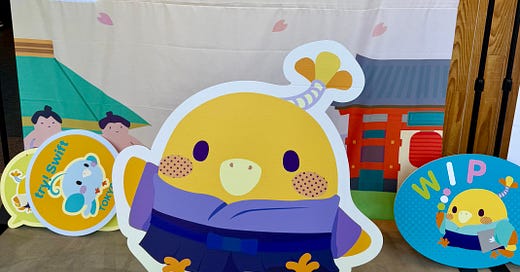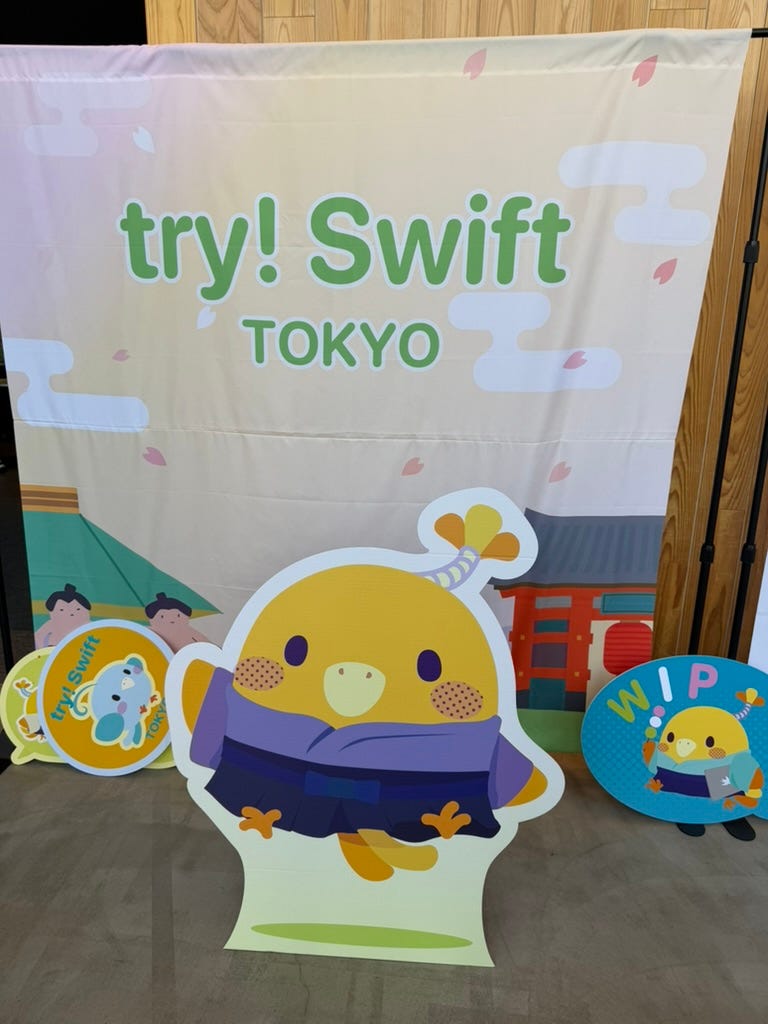Apple Developer Weekly #225 Proxyman is actually Proxy Manager, try! Swift Tokyo Experience
First time receiving sponsorship!
From 13
This issue of 13's Newsletter is particularly memorable because it's the first time I've received sponsorship! 🎉 The sponsor is Proxyman, a tool that I love using and I believe many developers do too.
Although I've been writing this newsletter for over 200 issues, I never really thought about including sponsorship ads until I saw this tweet from Proxyman. Mainly because I had a full-time job back then, and the newsletter was just a hobby.
But now, my "main daytime work" is iOS development content writing. Even though the content was mainly in Chinese, why not give it a try? So I gathered my courage to contact them, and eventually successfully negotiated this collaboration with founder Noah.
What makes me happiest is receiving support from a software I love using, and I'm also glad to see Proxyman grow from its indie development phase to becoming a company that can sponsor and support the developer community.
13 on April 14, 2025
🧑🚀Proxyman is actually Proxy Manager
Proxyman is a native macOS HTTP Debug Proxy. I've been using it for years, and my favorite part is how easily it handles iOS device or Simulator setup - it's practically tailor-made for iOS developers.
I'm sure many readers, like me, are long-time Proxyman users. But did you know? The name Proxyman isn't actually Proxy man, but Proxy manager. I only learned this from founder Noah's tweet.
While I didn't specifically ask about new features to introduce, I've been following his tweets. So there's one thing I'd like to tell readers: if your company is larger and more security-conscious, and you're considering purchasing similar tools, Proxyman is definitely worth considering. They recently passed SOC-2 Type 2 compliance, officially demonstrating their security capabilities for enterprise-level clients.
🐤try! Swift Tokyo 2025 Experience and Presentation Videos
I attended the three-day try! Swift Tokyo a few days ago. This was the 10th anniversary of try! Swift Tokyo, but it was my first time attending.
Organizing or attending a technical conference is no easy task. In 2020, a large group of Taiwanese developers wanted to attend try! Swift Tokyo, but it was cancelled due to the pandemic. From what I remember, the situation was so severe that most airlines were offering refunds. try! Swift Tokyo also suspended in-person events for several years.
This time, there were quite a few Taiwanese attendees. Not only was there one Taiwanese speaker, but we kept "discovering" more Taiwanese attendees each day, even finding an old friend who only contacted me during the closing ceremony. In the end, I stopped counting, but there were probably about 20 people in total. Plus some developers from China and Hong Kong. I have a series of tweets with group photos.
There were many impressive aspects of this try! Swift Tokyo.
Their iOS app is open source, and it's built using SwiftUI + TCA, a stack I'm very familiar with. I haven't had time to look at it in detail yet, but I'm sure I'll enjoy reading through it.
The app has a feature for real-time translation, using Flitto's solution. The results were excellent, completely practical. It was fast, highly accurate with technical terms, and had no problem recognizing both Japanese and native English speakers. It also handled various English accents from speakers around the world perfectly. Users could choose their preferred language to view the translations. I don't know how much it costs, but it's a great choice for international software conferences. At least that's my experience from actually using it.
And would you believe it? The conference ended on Friday, and they started releasing presentation videos on Saturday. By the time I'm writing this newsletter, about 2/3 of the videos are already up in this playlist:
I often say that at conferences, I prefer chatting outside rather than attending talks. But this time, the speaker lineup was incredibly strong - there wasn't a single talk I attended that I felt wasn't worth listening to. So I won't specifically recommend any particular ones; please check the playlist yourself to see what interests you!
The schedule was also well thought out, alternating between long and short talks with at least 30-minute breaks, so there was no worry about talks running over time. The event lasted 2.5 days in total, which was very satisfying.
The overall experience at try! Swift Tokyo was very comfortable, with perfect weather and a nearby cherry blossom viewing spot that was absolutely satisfying. The only thing I wasn't used to was how quiet the audience was, especially during English talks. It's good to be quiet during presentations, but there were many times when speakers reached exciting points or obvious punchlines, and I wanted to applaud, but the audience showed little reaction, which was quite a shame. Eventually, I started taking on the role of "atmosphere coordinator," giving applause where I felt it was deserved.
This phenomenon is probably related to language. Although real-time translation was fast, there was still a time lag. I wonder if there's something the organizers could do to enhance the interaction between speakers and audience, making the presentations more engaging? (I've been a speaker before, and audience reaction really makes a big difference in presentations.) Maybe they could arrange some quick-reacting staff to help boost the atmosphere?
As for other minor points, like the venue being in Tachikawa rather than central Tokyo, which might be far for many people, but it only took me about 50 minutes from where I was staying (which is normal for Tokyo commuters).
And while the venue was large, the space usage felt more suited for performances than conferences. I thought there could be more seating areas outside the lecture halls for attendees to use their computers and discuss together. But having participated in organizing conferences like iPlayground, I know venue limitations are often the most challenging aspect, so I don't see this as a major issue.
In conclusion, try! Swift Tokyo is an excellent international conference, and I strongly recommend readers attend next year.
Usually in the newsletter, I only report news and don't write such long personal experiences. But since the newsletter now has an English version, I thought the organizers might have a chance to read it, so I decided to write it as a conference experience. Thank you to the organizing team for your great work!
🤔Extended Thoughts: Scale of iOS Conferences in Taiwan
I also hope that iOS conferences in Taiwan could adopt an international organization model - inviting many excellent international speakers, renting larger venues and various facilities.
This would inevitably lead to significantly higher ticket prices (when I attended iOS Conf SG earlier this year, early bird tickets were about NT$6,300. For try! Swift Tokyo, I bought a regular ticket for about NT$5,600. The highest regular ticket price for iPlayground was probably NT$2,500 in 2019).
This would be a big challenge, but not impossible. Because at international conferences, when I tell foreigners I'm from Taiwan, they're very interested in attending events in Taiwan.
So what do local Taiwanese developers expect from conferences? I'm not talking about organizers, but attendees. Ask yourself: if you were to attend an iOS conference in Taiwan costing NT$5,000-6,000, what would you expect to see? What kind of speaker lineup would you want? The community needs to reflect these expectations to give confidence to those organizing such events.
If you don't have a reference point and can't answer, and you're in Asia, I genuinely recommend planning to attend next year's iOS Conf SG or try! Swift Tokyo.
🧩try! Swift Badge Design Ingenuity
Please look at the photo in the link.
The try! Swift Tokyo badges from each year can be arranged from right to left to form a complete picture, from 2017 to 2025 (skipping the pandemic-interrupted years 2020-2023), showing that the organizers have a continuous, far-reaching design vision.
Maybe I'm overthinking it, but this reminds me of stories about Japanese "centuries-old shops." Technology keeps changing, but excellent design elements can endure for years - I'm truly impressed.
On the other hand, this seems like it would drive collectors crazy, making them want to attend every year!
I also absolutely love try! Swift Tokyo's mascot chick. It's so cute!
🧪Apple Releases & News
From the Release Notes, these are all bug fixes, and very few at that.
‼️App Store Requires Xcode 16 Starting 4/24
This was reported in Issue 220 last month. The deadline is approaching, so here's another reminder. Please upgrade to Xcode 16 as soon as possible.
🧱SwiftWasm Announces Support for Swift 6.1
This is a new milestone for Swift's cross-platform capabilities.
SwiftWasm officially supports Swift 6.1, meaning you can use the latest Swift features to develop WebAssembly applications. According to the announcement, this is the first stable version that uses the official Swift toolchain (including compiler, stdlib, Foundation, etc.) without any custom patches.
You can also use the latest swiftly tool to install it.
Fatbobman also wrote an article about how to implement it.
🕳️macOS 15.4 Upgrades Built-in rsync, Affecting Some Toolchains
macOS 15.4 upgraded the built-in rsync to a modified version, which affects some behaviors. For example, files starting with ._ might encounter issues during the Flutter app upload process to App Store Connect.
🕶️Apple Releases Immersive Video Utility for Mac and visionOS
A new tool to help create immersive spatial videos. These are not the spatial videos shot on phones.
🛋️Apple Developer News Features Rooms App Interview
Apple's official coverage of an interview with the developers of Rooms, an Apple Design Awards winner.
Is Rooms an app or a game? Or both? Even the developers themselves can't describe it in one sentence.
My feeling is that it looks so cool that I don't really care what it is anymore.
🤖Report: Apple Preparing to Support External Open Source AI Models
Apple Intelligence previously could only use Apple's own models. According to The Information's report, Apple's internal management has approved using third-party open source AI models on local devices.
Let's continue to watch this development closely.
📱ChatGPT Running on iPhone 3GS?
ChatGPT for Legacy iOS is a ChatGPT client app that can run on iOS 6 and iPhone 3GS. The open source project is here.
This must have been quite challenging, as many things don't exist in such an old iOS version.
And the developer @bag_xml is reportedly only 17 years old.
The app's website also has an iOS 6 style. The whole thing is just fascinating.
📣Job Board
@riddle_ling's freelance post, feel free to check it out
If you have iOS development-related job openings or resumes you'd like to post in the Developer Weekly, please see About.
That's all for this week's Apple Developer Weekly. Feel free to like❤️, comment💬, or reply✉️ to share your thoughts.
Special thanks to Proxyman for sponsoring this issue of Apple Developer Weekly🙏
If you'd like to sponsor as well, please check out this page.
You can also join iOS Developer+ membership to get more exclusive advanced iOS knowledge and experience sharing.
If you'd like to make a one-time donation to 13 Newsletter, you can buy me some apples🍎 through Buy Me a Coffee, thank you.



